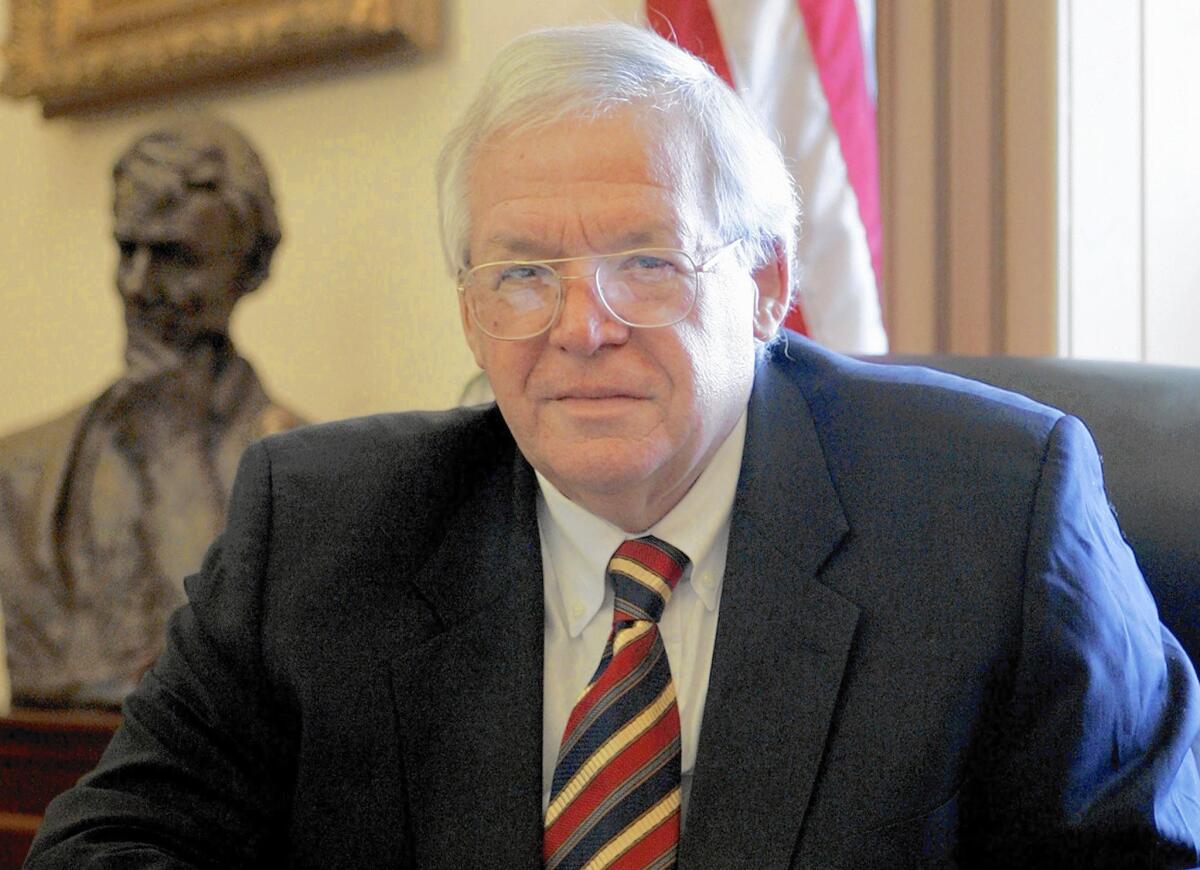Former House Speaker J. Dennis Hastertâs indictment resurrects Mark Foley scandal

Former House Speaker J. Dennis Hastert in 2007.
Reporting from WASHINGTON â Allegations that J. Dennis Hastert paid hush money to cover up years-old sexual misconduct have put a new light on criticism that, as House speaker, he failed to take action against a congressman who was making improper advances toward underage male pages.
The scandal involving former Rep. Mark Foley of Florida led to a 2006 House Ethics Committee investigation that found Hastert and many others were âwillfully ignorantâ in responding to repeated warnings that Foley had behaved improperly with pages and former pages.
Congressional expert Norman Ornstein said Hastertâs past actions could be viewed through a new lens in light of the explosive allegations he now faces.
âThe fact that the speaker of the House did nothing when there were multiple attempts to intervene [with Foley] is in itself appalling, without any future allegations about Hastertâs own past behavior,â said Ornstein, a resident scholar at the American Enterprise Institute.
âIf youâre getting warnings about potentially inappropriate conduct by a member of the House toward the pages, and you donât at minimum take that member aside and say, âStay the hell away from those pages,â and you do nothing â even not knowing at the time about Hastertâs own issues â I find it just appalling.â
Hastert, 73, is to appear in federal court in Chicago on Tuesday on charges that he lied to the FBI and improperly structured bank withdrawals of nearly $1 million in cash to evade required reports. The money, according to the federal indictment, was part of an agreement to pay an unidentified individual $3.5 million to compensate for and conceal past misconduct.
Law enforcement sources say the misconduct dates to when Hastert was a teacher and wrestling coach in Yorkville, Ill., before entering Congress.
Hastert was still speaker when the 2006 âsextingâ case involving Foley, then 52, exploded into public view. Foley quit Congress on Sept. 29, 2006, on the eve of a midterm election that proved disastrous for Republicans and resulted in Hastert losing his speakership when the new Democratic majority took over in 2007.
By the end of 2006, the House Ethics Committee put out a 200-plus page report indicating that Hastert, his aides and others had failed to take sufficient steps to put a stop to Foleyâs long-standing overtures to current and former House pages.
Hastert was singled out for not acting on warnings about Foleyâs emails â cautions delivered separately to him by two Republican officials in spring 2006. That was months before media attention on the sexually charged electronic communications Foley sent to former pages led to his resignation. The warnings came after top Hastert aides were told Foley was behaving inappropriately with male pages, the report said.
One of the officials who told investigators he briefed Hastert about the emails in June 2006 was current House Speaker John A. Boehner of Ohio, who was then House majority leader. The other congressman who said he talked to Hastert about Foley was Rep. Tom Reynolds of New York, who at the time was leading the National Republican Campaign Committee. Reynolds left Congress in 2009.
Boehner told the committee that when he spoke to Hastert about Foleyâs emails to a former page, Hastert said the matter âhas been taken care of.â
But Hastert told the committee he didnât recall the conversations in spring 2006 with Boehner or Reynolds about Foleyâs emails.
The committee, in its report, found the âweight of the evidenceâ supported the conclusion that Hastert was told, at least in passing, by both Boehner and Reynolds about Foleyâs worrisome emails. âIn all, a pattern of conduct was exhibited among many individuals to remain willfully ignorant of the potential consequencesâ of Foleyâs conduct with pages, the report said.
Hastert was one of eight lawmakers who testified about the Foley case before the committee, which heard from 43 other witnesses.
For almost a decade, Foley had been considered a ânuisanceâ and a âticking time bombâ because of his incessant attention to male pages, the committeeâs report said. A number of witnesses testified they had been told that in one case, Foley, possibly intoxicated, appeared at the page dorm after the pagesâ curfew and was turned away, the report said.
Foley, after leaving Congress, reportedly underwent alcoholism treatment, the report said.
As an ex-member, he was no longer under the committeeâs jurisdiction, and his lawyer said he would invoke his 5th Amendment rights if called to testify, the report said.
In the end, no one was sanctioned for violating House rules in the still-notorious case. Hastert was pleased and said so in a statement: âI am glad the committee made clear that there was no violation of any House rules by any member or staff.â
Twitter: @KatherineSkiba
More to Read
Sign up for Essential California
The most important California stories and recommendations in your inbox every morning.
You may occasionally receive promotional content from the Los Angeles Times.










